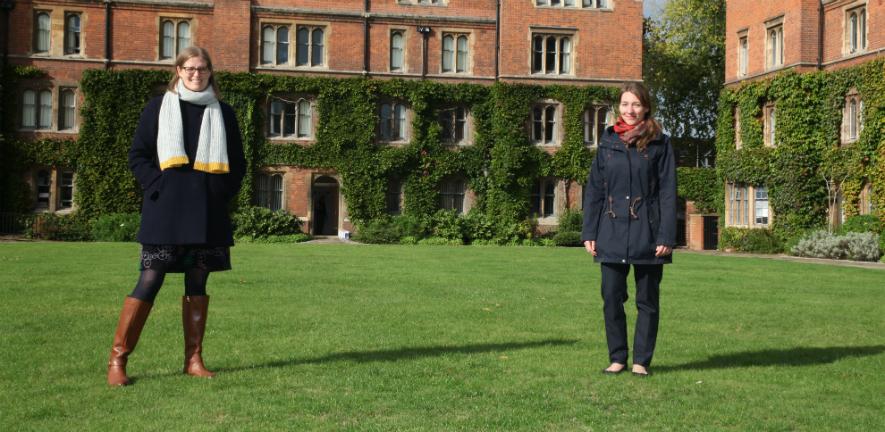
Submitted by Jane Durkin on Thu, 17/12/2020 - 09:55
Following the success of Dr Kirsty McDougall and her team in securing funding for their research on ‘Improving Voice Identification Procedures’ (IVIP), a new PhD studentship in forensic phonetics has now been established to work in this area.
The studentship is a collaboration between the University of Cambridge Phonetics Laboratory, Oxford Wave Research Ltd (OWR), a leading audio-processing and voice biometrics company experienced in developing solutions in forensic speech and audio, and the Cambridge Trust.
Dr Kirsty McDougall, University Lecturer in Phonetics in the Theoretical and Applied Linguistics Section and Cambridge Language Sciences network member will oversee the studentship which began in October 2020 and is based at Selwyn College, Cambridge. Kirsty is currently Principal Investigator on the ESRC-funded project IVIP (‘Improving Voice Identification Procedures’), an interdisciplinary project bringing together researchers in linguistics, psychology, criminology and law, with the aims of improving understanding of earwitness behaviour and improving the interaction of the criminal justice system with the use of earwitness evidence.
Forensic phonetics is the application of phonetic analysis to criminal cases, often where the identity of a speaker is in question, either due to an incriminating recording (e.g. hoax call, ransom demand, telephone threat, etc.) or due to a witness having heard a speech event at a crime scene. Both traditional phonetic and automatic (machine-based) techniques are used.
The PhD project aims to consider the relationships between traditional phonetic analyses and automatic speaker recognition (computer-based identification and recognition of the identity behind a voice). The studentship will include collaborative opportunities for the student to gain industry experience and to conduct research in conjunction with Oxford Wave Research, an audio processing and voice-biometrics company which specialises in developing solutions for law enforcement agencies in forensic voice comparison. The student’s research will consider both human and machine-based, algorithmic selection of different groups of speakers for various forensic analyses based on different criteria and the implication of the selections of these groups in the evaluation of the strength of evidence. These criteria include voice similarity perceived by human listeners and demographic features such as gender, language, age, regional accent. Further, the research will attempt to evaluate how the human or automatic, machine-based selection of databases can result in algorithmic bias.
Dr Kirsty McDougall said “We are delighted to be working with a leading audio-processing and voice biometrics company that has such a strong track record of developing solutions in the forensic speech and audio arena. Cambridge has a well-established tradition of research excellence and innovation in forensic phonetics and the opportunity to bring automatic speaker recognition techniques to complement our acoustic-phonetic and perceptual approaches represents an exciting new line of investigation for our Phonetics Lab”
Dr Anil Alexander, CEO of Oxford Wave Research said “This studentship overseen by Dr McDougall at the Phonetics Laboratory in Cambridge represents an incredible opportunity for us to formally collaborate with one of the best-regarded forensic phonetics research groups in the country, with an enduring legacy of fundamental and important research work. We look forward to the exciting research collaboration planned with the laboratory in this studentship that has important implications for how forensic casework involving speech is done in the future and which will help the legal system by providing timely, just and balanced analysis.”
The recipient of this studentship in 2020 is Ms Linda Gerlach. Linda obtained her undergraduate degree in Language and Communication at Philipps University Marburg, Germany, and went on to complete her masters degree in Speech Science with a focus on phonetics at the same university. For her masters thesis titled “A study on voice similarity ratings: humans versus machines”, she worked in collaboration with the University of Cambridge during an internship at Oxford Wave Research (2018-2019).
Image: Kirsty McDougall and PhD candidate Linda Gerlach in Selwyn College gardens
About Oxford Wave Research
Oxford Wave Research (OWR) is a specialised audio R&D company with expertise in voice biometrics, speaker diarization, audio fingerprinting and audio enhancement. The OWR team have contributed to major government projects, nationally and internationally. OWR has been particularly successful in bringing practical applications of state-of-the-art academic research algorithms to usable commercial products for law enforcement, military and other agencies. OWR’s solutions are used by law enforcement and forensic laboratories across the world including the UK, Germany, Netherlands, France, Canada, Switzerland. OWR are the creators of the well-established forensic voice comparison system ‘VOCALISE’, used in forensic audio labs across the world, as well as ‘WHISPERS’ which is a powerful networked ‘one to many’ voice comparison system.
About University of Cambridge Phonetics Laboratory
The University of Cambridge Phonetics Laboratory is based in the university’s Theoretical and Applied Linguistics Section, Faculty of Modern and Medieval Languages, and accommodates a strong community of teaching and research staff, research students, a number of affiliated researchers, and a lab manager. As well as hosting an extensive programme of research in forensic phonetics, the lab fosters research in phonetics and phonology across a diverse range of topics including speech production and perception, language acquisition, psycholinguistics, prosody, tone, sociophonetics, and language variation and change. Recent funded projects in forensic phonetics include DyViS, VoiceSim and IVIP.
